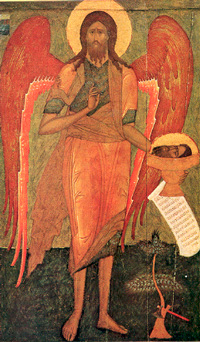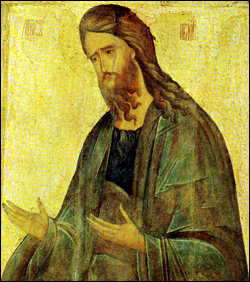Discourse On Saint John The Baptist

“In those days, - the Gospel tells us, — came John the Baptist, preaching in the wilderness and saying: “repent, for the Kingdom of Heaven is at hand” (Matt. 3:1-2). “In those days,” that is, in the days of the Lord Jesus Christ’s coming to earth, in the days when the Heavenly King appeared, in the days when the pre-eternal Light began to shine in the world. In those days John the Baptist comes and preaches in the wilderness, in an uninhabited land, for mankind at that time was like a wilderness, it had not yet become the abode of the Father, and the Son, and the Holy Spirit.
What did John proclaim? “Repent, for the Kingdom of Heaven is at hand.” John himself had a raiment of camel’s hair and a leather girdle around his loins (Matt. 3:4). Let us, too, my beloved brethren, attire ourselves in John’s raiment, for in this raiment is concealed the mystery of our salvation. This raiment is the image of people turning from paganism to faith.
John had a raiment of camel’s hair. The Holy Scriptures often liken the devil to a camel, in view of the latter’s pride, perfidy, and rage. In the writings of the Prophet Isaiah, for example, the watchman says from his watchtower: “And he saw a chariot of asses and a chariot of camels (Isaiah 21:7). The chariot of asses represents Christ, Who entered Jerusalem sitting upon an ass; while the chariot of camels represents the Antichrist, who will appear in the last days through the camel’s hair. With his preaching he attracted pagans, who were like hair covering the devil, and thus, by making the devil lose his “hair,” John the Baptist united these pagans with the Church.
“John himself…had a leather girdle around his loins.” The Holy Scriptures speak also of John’s girdle and loins, in order to show that carnal desires, which so oppose virtue, were deadened by the outward girdle made of dead skin; this girdle symbolized true internal chastity. According to the Gospel, John’s food was locusts and wild honey. This symbolizes the Jews’ abandonment of the law and the commandments, as it is described by the prophet: “Thy crowned ones are as the locusts, and thy captains as the great grasshoppers, which camp in the hedges in the cold day, but when the sun arises they flee away” (Nahum 3:17). And the wild honey indicates that by transgressing the commandments the Jews turned the sweetness of the law into bitterness for themselves.
“Then, - says the Gospel, - Jesus comes to Jordan unto John, to be baptized by him. But John restrained Him, saying: I have need to be baptized by Thee, and comest Thou to me? And Jesus replied to him: Suffer it to be so now, for thus we must fulfill all righteousness” (Matt. 3:13-15). Suffer it now, for it behooves you to be a witness concerning Me. I have come to teach that “except a man be born of water and of the Spirit, he cannot enter the Kingdom of God (John 3:5), and therefore I Myself must first fulfill that which I shall teach others to do. Suffer it now, for the words of the long-suffering Job must be fulfilled: “Not one man shall be clean of impurity, even if he lives on earth just a single day.” I must cleanse the ancient sinful impurity and renew the soul by means of the Spirit and the body by means of water.
Then John let Jesus alone. And when Jesus descended into Jordan, a great miracle appeared before the eyes of all those standing around: they saw the Source of all things being cleansed in the river, and the River of all bounty immersing Himself in water. Christ is truly the source of all things, as He Himself testifies, saying: “They have forsaken Me, the fountain of living waters” (Jeremiah 2:13). At the same time Jesus Christ is a river of all bounty, as can be seen from the following prophetic words: “The river of God has been filled with water” (Psalm 64:9). The Saviour has descended upon the waters, and they have become blessed, for He has blessed them. If any of you, dear brethren, has not yet washed himself in the fountain of eternal being, let him come and see what God the Father proclaims from the heavens about Jesus: “This is My beloved Son, in Whom I am well-pleased” (Matt. 3:17). “Hear Him” (Luke 9:35). Thus, a voice is heard at the Jordan River, the Father calls the Son by name, the Son cleanses the heavens and blesses the water, the Holy Spirit renews the earth and blesses the air. Now the ancient words of the psalm come to pass: “Day unto day uttereth speech” (Psalm 19:2). The day is the Father, and the day is the Son; and so, the Father passes the word unto the Son, as the Apostle Paul confirms when he exhorts us: “And take the sword of the Spirit, which is the word of God” (Ephesians 6:17). By this word may we all be joined in Jesus Christ, our Lord, unto Whom are due glory and worship unto ages of ages. Amen.
St. John Chrysostome
Let us follow Saint John the Baptist
“He must increase, while I must decrease” (John 3:30). One of the greatest trials for human nature is the realization of one’s insignificance before the moral loftiness of another human being. A great deal of humility is needed to yield to a rising luminary, knowing that everything that went before would be replaced by new forces, new points of view.

The growing power of the Saviour did not, however, arouse in St. John the Baptist even an iota of envy or bitterness. Being a strong, decisive, and independent person by nature, he could have competed with Christ by attracting the credulous crowd to himself and becoming the founder of a new teaching, establishing a new school of thought. But such an idea was totally foreign to St. John the Baptist. On the contrary, while drawing attention away from himself, he constantly and reverently pointed to Christ. Considering himself to be only the precursor of the Saviour, he was satisfied with announcing His arrival, and then disappeared from view like the morning star before sunrise. He immediately realized the majesty of the coming Saviour; from that moment everything personal in him disappeared and, as a mighty tree felled by lightning, he fell down before Christ, saying: “He must increase, while I must decrease.”
Let us learn total humility from St. John the Baptist, and let us learn to disregard our own ego in a common effort, being always ready to give way to another. Let us first and foremost keep in mind the goal which we are striving to attain, without being bogged down in petty details which often hinder the whole matter. The common effort will have greater power and greater benefit if it is not diluted by the personal considerations and petty feelings that so often destroy the entire cause! Following the example of the Baptist, let us always be ready to remain in the shadow and to rejoice over the success of others; let us not be concerned with our own glory, and let us not allow the evil spirit of envy to enter our hearts, but let us rather pray that the grace of selflessness and self-abnegation be granted to us. Let us also remember that John’s main concern was to point to Christ, and that his major testimony concerning Him was: “Here is the Lamb of God Who takes upon Himself the sins of the world.” He pointed Christ out, he sent the people to Him, he rejoiced over Him and triumphantly proclaimed: “The Father loves the Son and has given all into His hands.”
Let our hearts echo John in this; let us glorify Christ with our lips and our lives, so that He may reign supreme in our souls, and so that we (in our sinful nature) may decrease, while He may increase in us.
(From “Day by Day” – a book of spiritual reflections)
|